Total Reward Systems: Theories, Effectiveness, and Applications
VerifiedAdded on 2020/09/08
|11
|3389
|33
Report
AI Summary
This report delves into the concept of total reward systems, outlining their role in attracting, motivating, and retaining employees through financial and non-financial rewards. It explores the link between reward systems and motivational theories, including Maslow's hierarchy of needs, Theory X and Y, and Herzberg's two-factor theory, providing real-world examples from companies like Tesco and British Airways. The report then evaluates the effectiveness of reward systems in the supermarket and airline industries, highlighting objectives such as attracting top talent, retaining employees, boosting motivation, and ensuring compliance. The analysis emphasizes the impact of bonus schemes, employee morale, and various motivational strategies on business outcomes, offering a comprehensive overview of reward system applications and their contribution to organizational success.
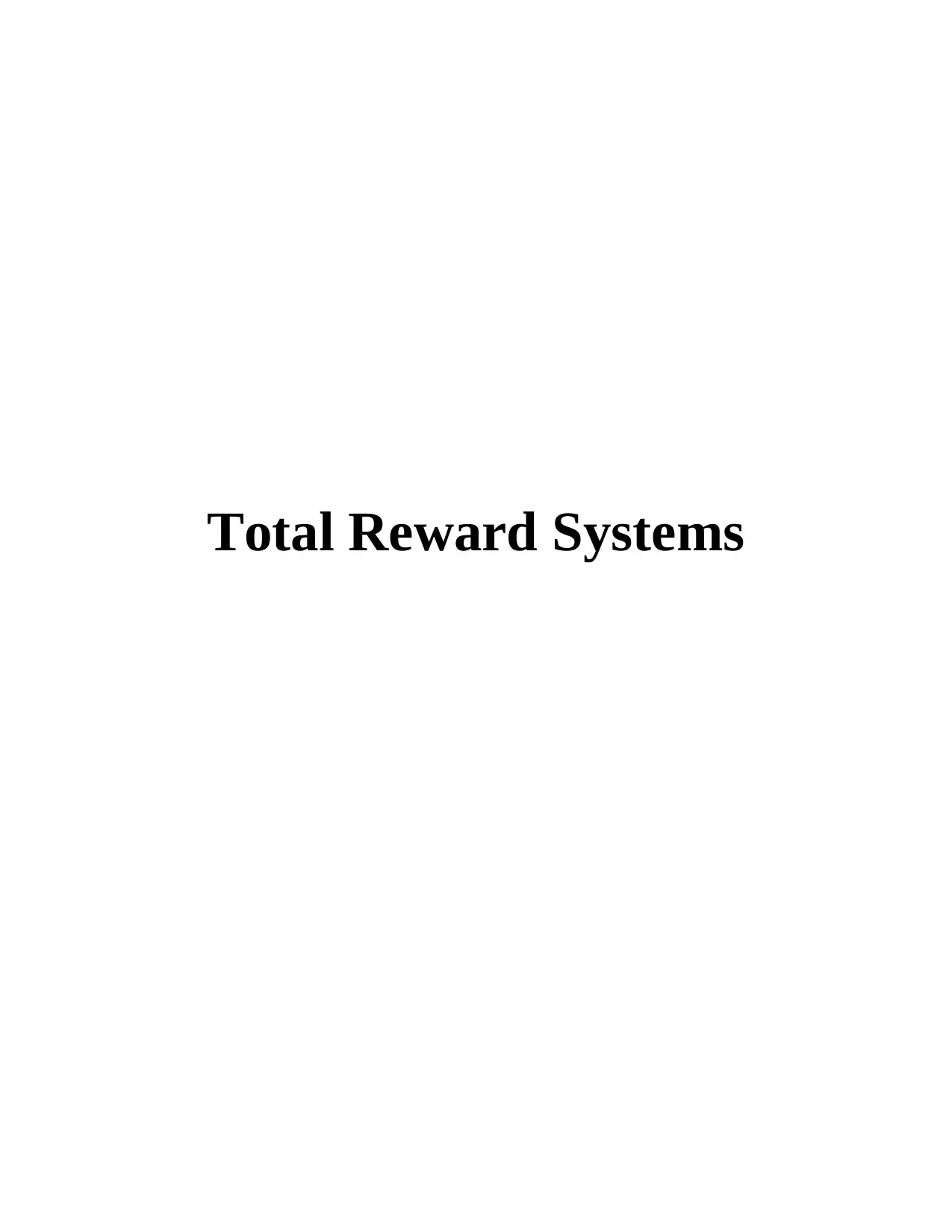
Total Reward Systems
Paraphrase This Document
Need a fresh take? Get an instant paraphrase of this document with our AI Paraphraser
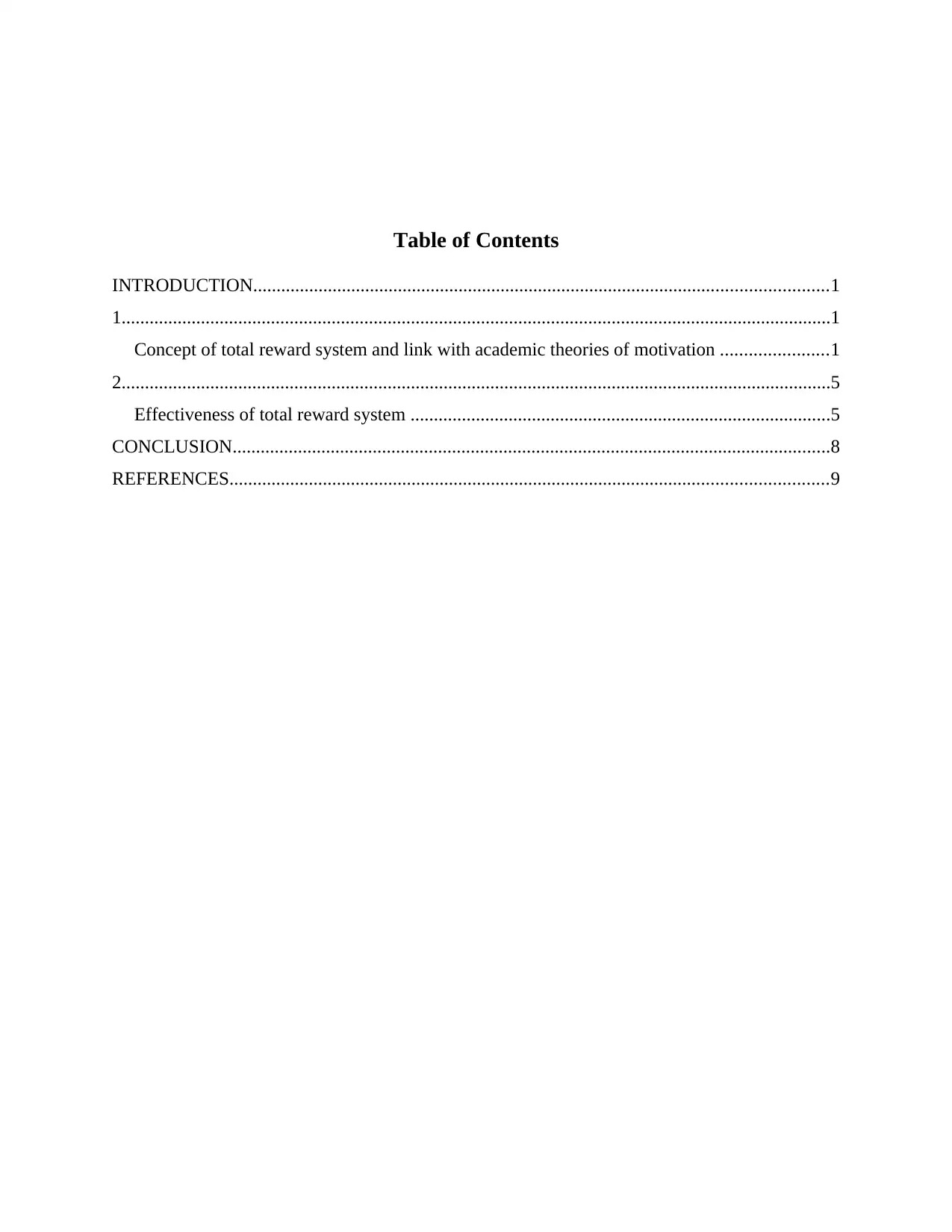
Table of Contents
INTRODUCTION...........................................................................................................................1
1........................................................................................................................................................1
Concept of total reward system and link with academic theories of motivation .......................1
2........................................................................................................................................................5
Effectiveness of total reward system ..........................................................................................5
CONCLUSION................................................................................................................................8
REFERENCES................................................................................................................................9
INTRODUCTION...........................................................................................................................1
1........................................................................................................................................................1
Concept of total reward system and link with academic theories of motivation .......................1
2........................................................................................................................................................5
Effectiveness of total reward system ..........................................................................................5
CONCLUSION................................................................................................................................8
REFERENCES................................................................................................................................9
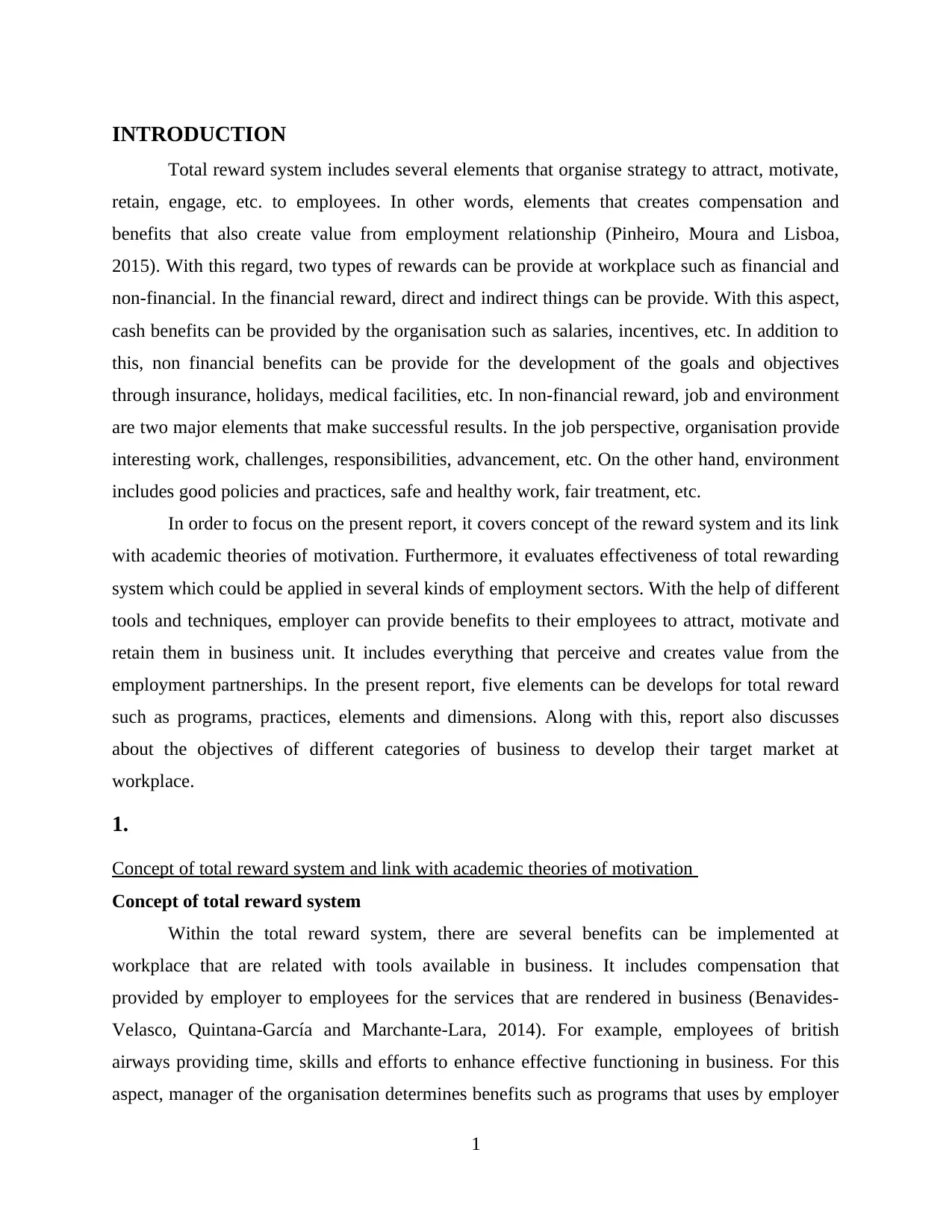
INTRODUCTION
Total reward system includes several elements that organise strategy to attract, motivate,
retain, engage, etc. to employees. In other words, elements that creates compensation and
benefits that also create value from employment relationship (Pinheiro, Moura and Lisboa,
2015). With this regard, two types of rewards can be provide at workplace such as financial and
non-financial. In the financial reward, direct and indirect things can be provide. With this aspect,
cash benefits can be provided by the organisation such as salaries, incentives, etc. In addition to
this, non financial benefits can be provide for the development of the goals and objectives
through insurance, holidays, medical facilities, etc. In non-financial reward, job and environment
are two major elements that make successful results. In the job perspective, organisation provide
interesting work, challenges, responsibilities, advancement, etc. On the other hand, environment
includes good policies and practices, safe and healthy work, fair treatment, etc.
In order to focus on the present report, it covers concept of the reward system and its link
with academic theories of motivation. Furthermore, it evaluates effectiveness of total rewarding
system which could be applied in several kinds of employment sectors. With the help of different
tools and techniques, employer can provide benefits to their employees to attract, motivate and
retain them in business unit. It includes everything that perceive and creates value from the
employment partnerships. In the present report, five elements can be develops for total reward
such as programs, practices, elements and dimensions. Along with this, report also discusses
about the objectives of different categories of business to develop their target market at
workplace.
1.
Concept of total reward system and link with academic theories of motivation
Concept of total reward system
Within the total reward system, there are several benefits can be implemented at
workplace that are related with tools available in business. It includes compensation that
provided by employer to employees for the services that are rendered in business (Benavides-
Velasco, Quintana-García and Marchante-Lara, 2014). For example, employees of british
airways providing time, skills and efforts to enhance effective functioning in business. For this
aspect, manager of the organisation determines benefits such as programs that uses by employer
1
Total reward system includes several elements that organise strategy to attract, motivate,
retain, engage, etc. to employees. In other words, elements that creates compensation and
benefits that also create value from employment relationship (Pinheiro, Moura and Lisboa,
2015). With this regard, two types of rewards can be provide at workplace such as financial and
non-financial. In the financial reward, direct and indirect things can be provide. With this aspect,
cash benefits can be provided by the organisation such as salaries, incentives, etc. In addition to
this, non financial benefits can be provide for the development of the goals and objectives
through insurance, holidays, medical facilities, etc. In non-financial reward, job and environment
are two major elements that make successful results. In the job perspective, organisation provide
interesting work, challenges, responsibilities, advancement, etc. On the other hand, environment
includes good policies and practices, safe and healthy work, fair treatment, etc.
In order to focus on the present report, it covers concept of the reward system and its link
with academic theories of motivation. Furthermore, it evaluates effectiveness of total rewarding
system which could be applied in several kinds of employment sectors. With the help of different
tools and techniques, employer can provide benefits to their employees to attract, motivate and
retain them in business unit. It includes everything that perceive and creates value from the
employment partnerships. In the present report, five elements can be develops for total reward
such as programs, practices, elements and dimensions. Along with this, report also discusses
about the objectives of different categories of business to develop their target market at
workplace.
1.
Concept of total reward system and link with academic theories of motivation
Concept of total reward system
Within the total reward system, there are several benefits can be implemented at
workplace that are related with tools available in business. It includes compensation that
provided by employer to employees for the services that are rendered in business (Benavides-
Velasco, Quintana-García and Marchante-Lara, 2014). For example, employees of british
airways providing time, skills and efforts to enhance effective functioning in business. For this
aspect, manager of the organisation determines benefits such as programs that uses by employer
1
⊘ This is a preview!⊘
Do you want full access?
Subscribe today to unlock all pages.

Trusted by 1+ million students worldwide
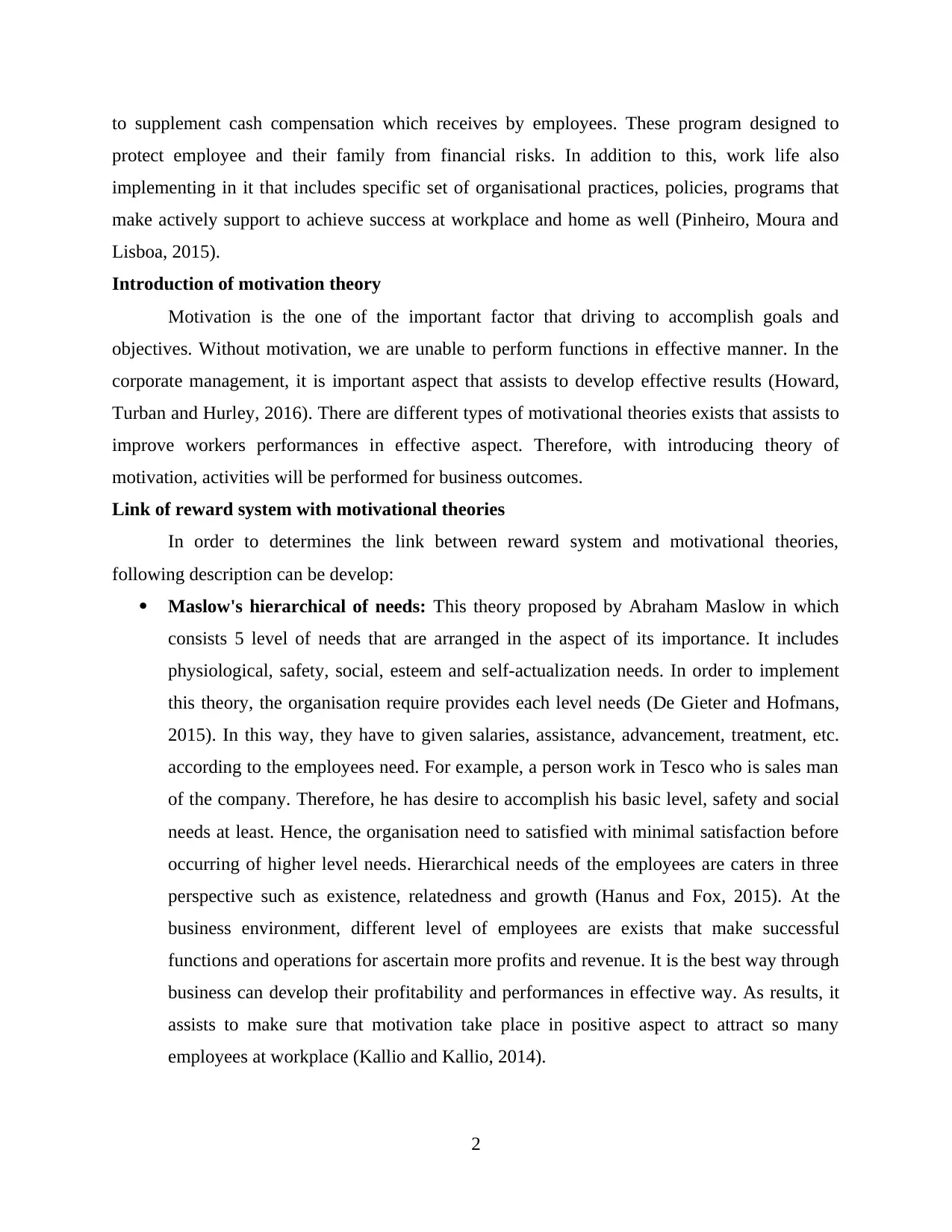
to supplement cash compensation which receives by employees. These program designed to
protect employee and their family from financial risks. In addition to this, work life also
implementing in it that includes specific set of organisational practices, policies, programs that
make actively support to achieve success at workplace and home as well (Pinheiro, Moura and
Lisboa, 2015).
Introduction of motivation theory
Motivation is the one of the important factor that driving to accomplish goals and
objectives. Without motivation, we are unable to perform functions in effective manner. In the
corporate management, it is important aspect that assists to develop effective results (Howard,
Turban and Hurley, 2016). There are different types of motivational theories exists that assists to
improve workers performances in effective aspect. Therefore, with introducing theory of
motivation, activities will be performed for business outcomes.
Link of reward system with motivational theories
In order to determines the link between reward system and motivational theories,
following description can be develop:
Maslow's hierarchical of needs: This theory proposed by Abraham Maslow in which
consists 5 level of needs that are arranged in the aspect of its importance. It includes
physiological, safety, social, esteem and self-actualization needs. In order to implement
this theory, the organisation require provides each level needs (De Gieter and Hofmans,
2015). In this way, they have to given salaries, assistance, advancement, treatment, etc.
according to the employees need. For example, a person work in Tesco who is sales man
of the company. Therefore, he has desire to accomplish his basic level, safety and social
needs at least. Hence, the organisation need to satisfied with minimal satisfaction before
occurring of higher level needs. Hierarchical needs of the employees are caters in three
perspective such as existence, relatedness and growth (Hanus and Fox, 2015). At the
business environment, different level of employees are exists that make successful
functions and operations for ascertain more profits and revenue. It is the best way through
business can develop their profitability and performances in effective way. As results, it
assists to make sure that motivation take place in positive aspect to attract so many
employees at workplace (Kallio and Kallio, 2014).
2
protect employee and their family from financial risks. In addition to this, work life also
implementing in it that includes specific set of organisational practices, policies, programs that
make actively support to achieve success at workplace and home as well (Pinheiro, Moura and
Lisboa, 2015).
Introduction of motivation theory
Motivation is the one of the important factor that driving to accomplish goals and
objectives. Without motivation, we are unable to perform functions in effective manner. In the
corporate management, it is important aspect that assists to develop effective results (Howard,
Turban and Hurley, 2016). There are different types of motivational theories exists that assists to
improve workers performances in effective aspect. Therefore, with introducing theory of
motivation, activities will be performed for business outcomes.
Link of reward system with motivational theories
In order to determines the link between reward system and motivational theories,
following description can be develop:
Maslow's hierarchical of needs: This theory proposed by Abraham Maslow in which
consists 5 level of needs that are arranged in the aspect of its importance. It includes
physiological, safety, social, esteem and self-actualization needs. In order to implement
this theory, the organisation require provides each level needs (De Gieter and Hofmans,
2015). In this way, they have to given salaries, assistance, advancement, treatment, etc.
according to the employees need. For example, a person work in Tesco who is sales man
of the company. Therefore, he has desire to accomplish his basic level, safety and social
needs at least. Hence, the organisation need to satisfied with minimal satisfaction before
occurring of higher level needs. Hierarchical needs of the employees are caters in three
perspective such as existence, relatedness and growth (Hanus and Fox, 2015). At the
business environment, different level of employees are exists that make successful
functions and operations for ascertain more profits and revenue. It is the best way through
business can develop their profitability and performances in effective way. As results, it
assists to make sure that motivation take place in positive aspect to attract so many
employees at workplace (Kallio and Kallio, 2014).
2
Paraphrase This Document
Need a fresh take? Get an instant paraphrase of this document with our AI Paraphraser
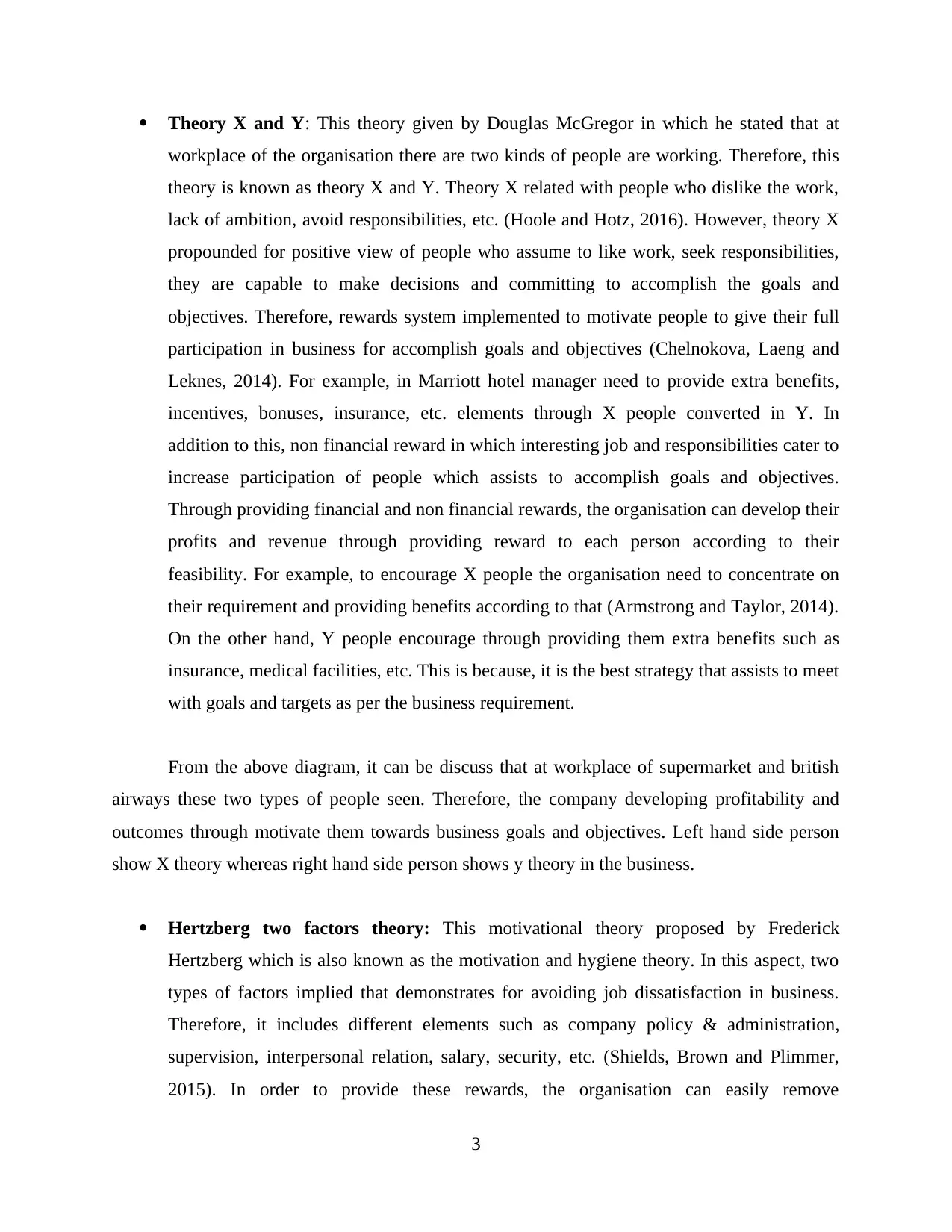
Theory X and Y: This theory given by Douglas McGregor in which he stated that at
workplace of the organisation there are two kinds of people are working. Therefore, this
theory is known as theory X and Y. Theory X related with people who dislike the work,
lack of ambition, avoid responsibilities, etc. (Hoole and Hotz, 2016). However, theory X
propounded for positive view of people who assume to like work, seek responsibilities,
they are capable to make decisions and committing to accomplish the goals and
objectives. Therefore, rewards system implemented to motivate people to give their full
participation in business for accomplish goals and objectives (Chelnokova, Laeng and
Leknes, 2014). For example, in Marriott hotel manager need to provide extra benefits,
incentives, bonuses, insurance, etc. elements through X people converted in Y. In
addition to this, non financial reward in which interesting job and responsibilities cater to
increase participation of people which assists to accomplish goals and objectives.
Through providing financial and non financial rewards, the organisation can develop their
profits and revenue through providing reward to each person according to their
feasibility. For example, to encourage X people the organisation need to concentrate on
their requirement and providing benefits according to that (Armstrong and Taylor, 2014).
On the other hand, Y people encourage through providing them extra benefits such as
insurance, medical facilities, etc. This is because, it is the best strategy that assists to meet
with goals and targets as per the business requirement.
From the above diagram, it can be discuss that at workplace of supermarket and british
airways these two types of people seen. Therefore, the company developing profitability and
outcomes through motivate them towards business goals and objectives. Left hand side person
show X theory whereas right hand side person shows y theory in the business.
Hertzberg two factors theory: This motivational theory proposed by Frederick
Hertzberg which is also known as the motivation and hygiene theory. In this aspect, two
types of factors implied that demonstrates for avoiding job dissatisfaction in business.
Therefore, it includes different elements such as company policy & administration,
supervision, interpersonal relation, salary, security, etc. (Shields, Brown and Plimmer,
2015). In order to provide these rewards, the organisation can easily remove
3
workplace of the organisation there are two kinds of people are working. Therefore, this
theory is known as theory X and Y. Theory X related with people who dislike the work,
lack of ambition, avoid responsibilities, etc. (Hoole and Hotz, 2016). However, theory X
propounded for positive view of people who assume to like work, seek responsibilities,
they are capable to make decisions and committing to accomplish the goals and
objectives. Therefore, rewards system implemented to motivate people to give their full
participation in business for accomplish goals and objectives (Chelnokova, Laeng and
Leknes, 2014). For example, in Marriott hotel manager need to provide extra benefits,
incentives, bonuses, insurance, etc. elements through X people converted in Y. In
addition to this, non financial reward in which interesting job and responsibilities cater to
increase participation of people which assists to accomplish goals and objectives.
Through providing financial and non financial rewards, the organisation can develop their
profits and revenue through providing reward to each person according to their
feasibility. For example, to encourage X people the organisation need to concentrate on
their requirement and providing benefits according to that (Armstrong and Taylor, 2014).
On the other hand, Y people encourage through providing them extra benefits such as
insurance, medical facilities, etc. This is because, it is the best strategy that assists to meet
with goals and targets as per the business requirement.
From the above diagram, it can be discuss that at workplace of supermarket and british
airways these two types of people seen. Therefore, the company developing profitability and
outcomes through motivate them towards business goals and objectives. Left hand side person
show X theory whereas right hand side person shows y theory in the business.
Hertzberg two factors theory: This motivational theory proposed by Frederick
Hertzberg which is also known as the motivation and hygiene theory. In this aspect, two
types of factors implied that demonstrates for avoiding job dissatisfaction in business.
Therefore, it includes different elements such as company policy & administration,
supervision, interpersonal relation, salary, security, etc. (Shields, Brown and Plimmer,
2015). In order to provide these rewards, the organisation can easily remove
3
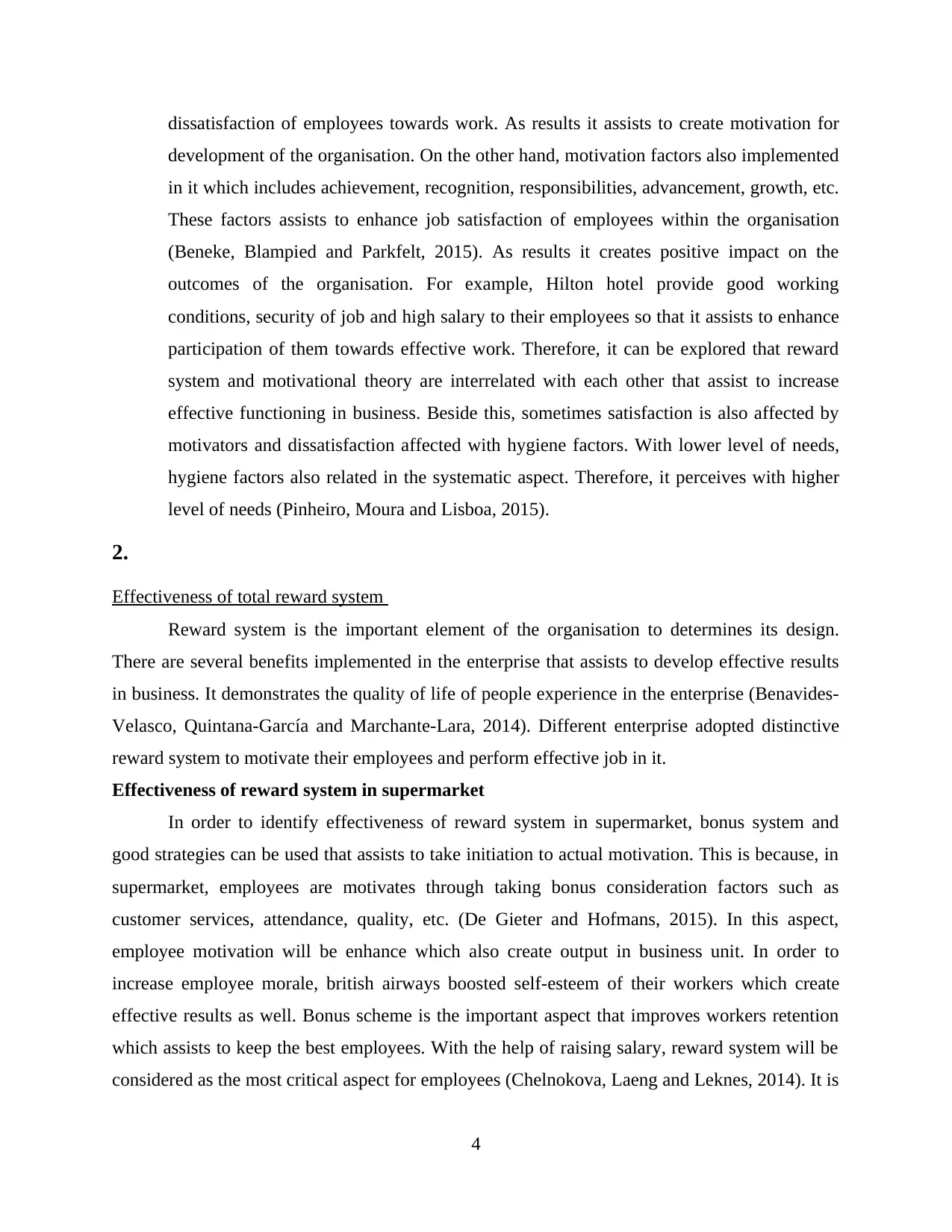
dissatisfaction of employees towards work. As results it assists to create motivation for
development of the organisation. On the other hand, motivation factors also implemented
in it which includes achievement, recognition, responsibilities, advancement, growth, etc.
These factors assists to enhance job satisfaction of employees within the organisation
(Beneke, Blampied and Parkfelt, 2015). As results it creates positive impact on the
outcomes of the organisation. For example, Hilton hotel provide good working
conditions, security of job and high salary to their employees so that it assists to enhance
participation of them towards effective work. Therefore, it can be explored that reward
system and motivational theory are interrelated with each other that assist to increase
effective functioning in business. Beside this, sometimes satisfaction is also affected by
motivators and dissatisfaction affected with hygiene factors. With lower level of needs,
hygiene factors also related in the systematic aspect. Therefore, it perceives with higher
level of needs (Pinheiro, Moura and Lisboa, 2015).
2.
Effectiveness of total reward system
Reward system is the important element of the organisation to determines its design.
There are several benefits implemented in the enterprise that assists to develop effective results
in business. It demonstrates the quality of life of people experience in the enterprise (Benavides-
Velasco, Quintana-García and Marchante-Lara, 2014). Different enterprise adopted distinctive
reward system to motivate their employees and perform effective job in it.
Effectiveness of reward system in supermarket
In order to identify effectiveness of reward system in supermarket, bonus system and
good strategies can be used that assists to take initiation to actual motivation. This is because, in
supermarket, employees are motivates through taking bonus consideration factors such as
customer services, attendance, quality, etc. (De Gieter and Hofmans, 2015). In this aspect,
employee motivation will be enhance which also create output in business unit. In order to
increase employee morale, british airways boosted self-esteem of their workers which create
effective results as well. Bonus scheme is the important aspect that improves workers retention
which assists to keep the best employees. With the help of raising salary, reward system will be
considered as the most critical aspect for employees (Chelnokova, Laeng and Leknes, 2014). It is
4
development of the organisation. On the other hand, motivation factors also implemented
in it which includes achievement, recognition, responsibilities, advancement, growth, etc.
These factors assists to enhance job satisfaction of employees within the organisation
(Beneke, Blampied and Parkfelt, 2015). As results it creates positive impact on the
outcomes of the organisation. For example, Hilton hotel provide good working
conditions, security of job and high salary to their employees so that it assists to enhance
participation of them towards effective work. Therefore, it can be explored that reward
system and motivational theory are interrelated with each other that assist to increase
effective functioning in business. Beside this, sometimes satisfaction is also affected by
motivators and dissatisfaction affected with hygiene factors. With lower level of needs,
hygiene factors also related in the systematic aspect. Therefore, it perceives with higher
level of needs (Pinheiro, Moura and Lisboa, 2015).
2.
Effectiveness of total reward system
Reward system is the important element of the organisation to determines its design.
There are several benefits implemented in the enterprise that assists to develop effective results
in business. It demonstrates the quality of life of people experience in the enterprise (Benavides-
Velasco, Quintana-García and Marchante-Lara, 2014). Different enterprise adopted distinctive
reward system to motivate their employees and perform effective job in it.
Effectiveness of reward system in supermarket
In order to identify effectiveness of reward system in supermarket, bonus system and
good strategies can be used that assists to take initiation to actual motivation. This is because, in
supermarket, employees are motivates through taking bonus consideration factors such as
customer services, attendance, quality, etc. (De Gieter and Hofmans, 2015). In this aspect,
employee motivation will be enhance which also create output in business unit. In order to
increase employee morale, british airways boosted self-esteem of their workers which create
effective results as well. Bonus scheme is the important aspect that improves workers retention
which assists to keep the best employees. With the help of raising salary, reward system will be
considered as the most critical aspect for employees (Chelnokova, Laeng and Leknes, 2014). It is
4
⊘ This is a preview!⊘
Do you want full access?
Subscribe today to unlock all pages.

Trusted by 1+ million students worldwide
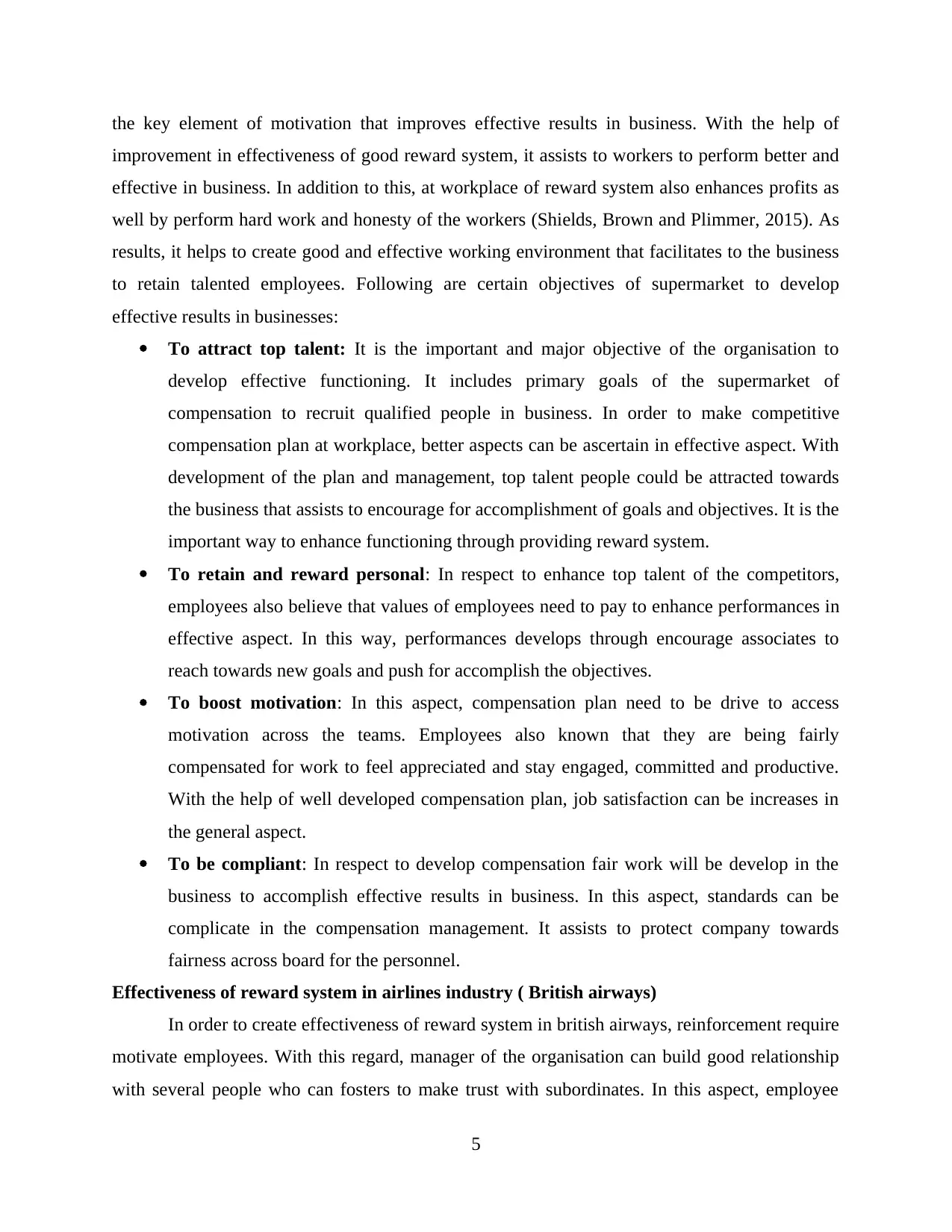
the key element of motivation that improves effective results in business. With the help of
improvement in effectiveness of good reward system, it assists to workers to perform better and
effective in business. In addition to this, at workplace of reward system also enhances profits as
well by perform hard work and honesty of the workers (Shields, Brown and Plimmer, 2015). As
results, it helps to create good and effective working environment that facilitates to the business
to retain talented employees. Following are certain objectives of supermarket to develop
effective results in businesses:
To attract top talent: It is the important and major objective of the organisation to
develop effective functioning. It includes primary goals of the supermarket of
compensation to recruit qualified people in business. In order to make competitive
compensation plan at workplace, better aspects can be ascertain in effective aspect. With
development of the plan and management, top talent people could be attracted towards
the business that assists to encourage for accomplishment of goals and objectives. It is the
important way to enhance functioning through providing reward system.
To retain and reward personal: In respect to enhance top talent of the competitors,
employees also believe that values of employees need to pay to enhance performances in
effective aspect. In this way, performances develops through encourage associates to
reach towards new goals and push for accomplish the objectives.
To boost motivation: In this aspect, compensation plan need to be drive to access
motivation across the teams. Employees also known that they are being fairly
compensated for work to feel appreciated and stay engaged, committed and productive.
With the help of well developed compensation plan, job satisfaction can be increases in
the general aspect.
To be compliant: In respect to develop compensation fair work will be develop in the
business to accomplish effective results in business. In this aspect, standards can be
complicate in the compensation management. It assists to protect company towards
fairness across board for the personnel.
Effectiveness of reward system in airlines industry ( British airways)
In order to create effectiveness of reward system in british airways, reinforcement require
motivate employees. With this regard, manager of the organisation can build good relationship
with several people who can fosters to make trust with subordinates. In this aspect, employee
5
improvement in effectiveness of good reward system, it assists to workers to perform better and
effective in business. In addition to this, at workplace of reward system also enhances profits as
well by perform hard work and honesty of the workers (Shields, Brown and Plimmer, 2015). As
results, it helps to create good and effective working environment that facilitates to the business
to retain talented employees. Following are certain objectives of supermarket to develop
effective results in businesses:
To attract top talent: It is the important and major objective of the organisation to
develop effective functioning. It includes primary goals of the supermarket of
compensation to recruit qualified people in business. In order to make competitive
compensation plan at workplace, better aspects can be ascertain in effective aspect. With
development of the plan and management, top talent people could be attracted towards
the business that assists to encourage for accomplishment of goals and objectives. It is the
important way to enhance functioning through providing reward system.
To retain and reward personal: In respect to enhance top talent of the competitors,
employees also believe that values of employees need to pay to enhance performances in
effective aspect. In this way, performances develops through encourage associates to
reach towards new goals and push for accomplish the objectives.
To boost motivation: In this aspect, compensation plan need to be drive to access
motivation across the teams. Employees also known that they are being fairly
compensated for work to feel appreciated and stay engaged, committed and productive.
With the help of well developed compensation plan, job satisfaction can be increases in
the general aspect.
To be compliant: In respect to develop compensation fair work will be develop in the
business to accomplish effective results in business. In this aspect, standards can be
complicate in the compensation management. It assists to protect company towards
fairness across board for the personnel.
Effectiveness of reward system in airlines industry ( British airways)
In order to create effectiveness of reward system in british airways, reinforcement require
motivate employees. With this regard, manager of the organisation can build good relationship
with several people who can fosters to make trust with subordinates. In this aspect, employee
5
Paraphrase This Document
Need a fresh take? Get an instant paraphrase of this document with our AI Paraphraser
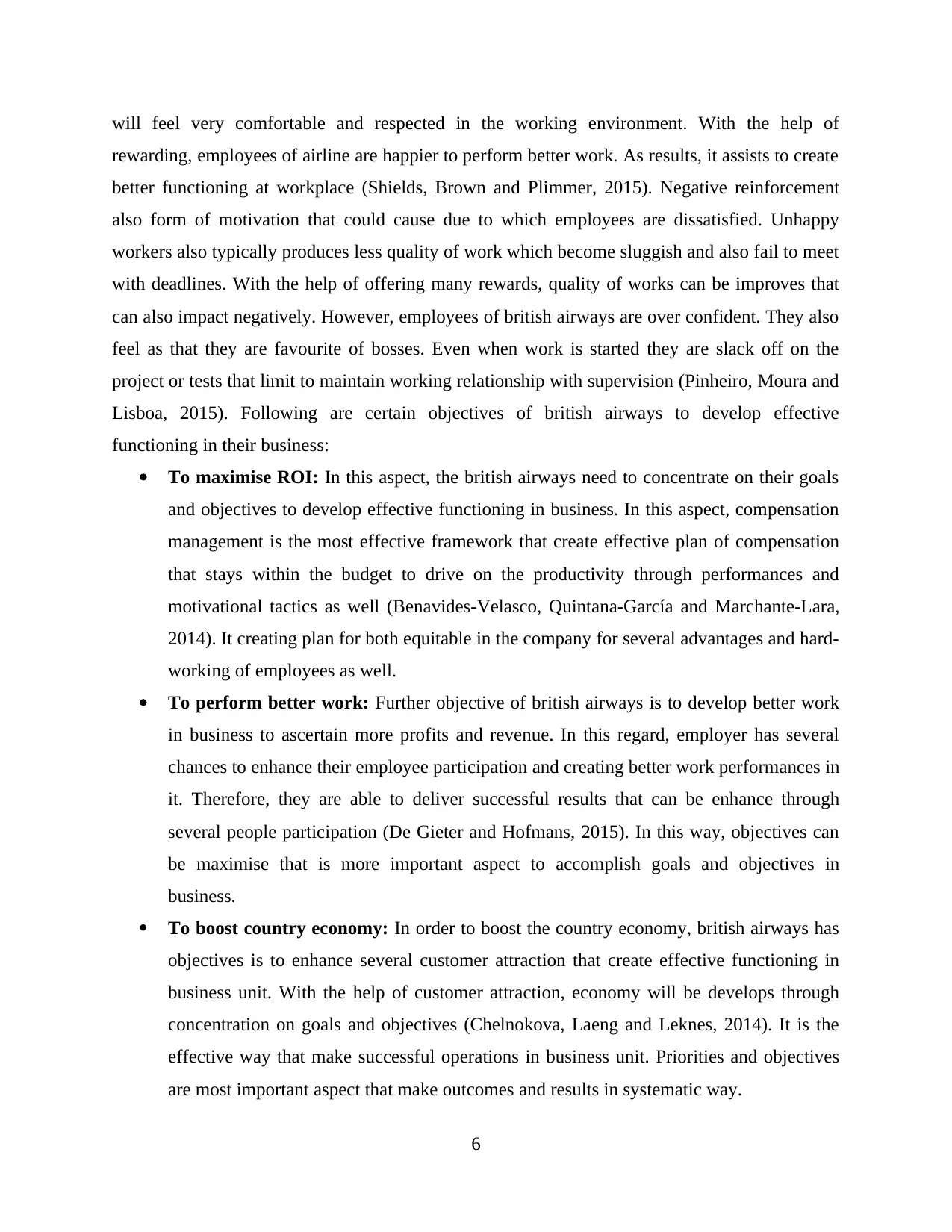
will feel very comfortable and respected in the working environment. With the help of
rewarding, employees of airline are happier to perform better work. As results, it assists to create
better functioning at workplace (Shields, Brown and Plimmer, 2015). Negative reinforcement
also form of motivation that could cause due to which employees are dissatisfied. Unhappy
workers also typically produces less quality of work which become sluggish and also fail to meet
with deadlines. With the help of offering many rewards, quality of works can be improves that
can also impact negatively. However, employees of british airways are over confident. They also
feel as that they are favourite of bosses. Even when work is started they are slack off on the
project or tests that limit to maintain working relationship with supervision (Pinheiro, Moura and
Lisboa, 2015). Following are certain objectives of british airways to develop effective
functioning in their business:
To maximise ROI: In this aspect, the british airways need to concentrate on their goals
and objectives to develop effective functioning in business. In this aspect, compensation
management is the most effective framework that create effective plan of compensation
that stays within the budget to drive on the productivity through performances and
motivational tactics as well (Benavides-Velasco, Quintana-García and Marchante-Lara,
2014). It creating plan for both equitable in the company for several advantages and hard-
working of employees as well.
To perform better work: Further objective of british airways is to develop better work
in business to ascertain more profits and revenue. In this regard, employer has several
chances to enhance their employee participation and creating better work performances in
it. Therefore, they are able to deliver successful results that can be enhance through
several people participation (De Gieter and Hofmans, 2015). In this way, objectives can
be maximise that is more important aspect to accomplish goals and objectives in
business.
To boost country economy: In order to boost the country economy, british airways has
objectives is to enhance several customer attraction that create effective functioning in
business unit. With the help of customer attraction, economy will be develops through
concentration on goals and objectives (Chelnokova, Laeng and Leknes, 2014). It is the
effective way that make successful operations in business unit. Priorities and objectives
are most important aspect that make outcomes and results in systematic way.
6
rewarding, employees of airline are happier to perform better work. As results, it assists to create
better functioning at workplace (Shields, Brown and Plimmer, 2015). Negative reinforcement
also form of motivation that could cause due to which employees are dissatisfied. Unhappy
workers also typically produces less quality of work which become sluggish and also fail to meet
with deadlines. With the help of offering many rewards, quality of works can be improves that
can also impact negatively. However, employees of british airways are over confident. They also
feel as that they are favourite of bosses. Even when work is started they are slack off on the
project or tests that limit to maintain working relationship with supervision (Pinheiro, Moura and
Lisboa, 2015). Following are certain objectives of british airways to develop effective
functioning in their business:
To maximise ROI: In this aspect, the british airways need to concentrate on their goals
and objectives to develop effective functioning in business. In this aspect, compensation
management is the most effective framework that create effective plan of compensation
that stays within the budget to drive on the productivity through performances and
motivational tactics as well (Benavides-Velasco, Quintana-García and Marchante-Lara,
2014). It creating plan for both equitable in the company for several advantages and hard-
working of employees as well.
To perform better work: Further objective of british airways is to develop better work
in business to ascertain more profits and revenue. In this regard, employer has several
chances to enhance their employee participation and creating better work performances in
it. Therefore, they are able to deliver successful results that can be enhance through
several people participation (De Gieter and Hofmans, 2015). In this way, objectives can
be maximise that is more important aspect to accomplish goals and objectives in
business.
To boost country economy: In order to boost the country economy, british airways has
objectives is to enhance several customer attraction that create effective functioning in
business unit. With the help of customer attraction, economy will be develops through
concentration on goals and objectives (Chelnokova, Laeng and Leknes, 2014). It is the
effective way that make successful operations in business unit. Priorities and objectives
are most important aspect that make outcomes and results in systematic way.
6
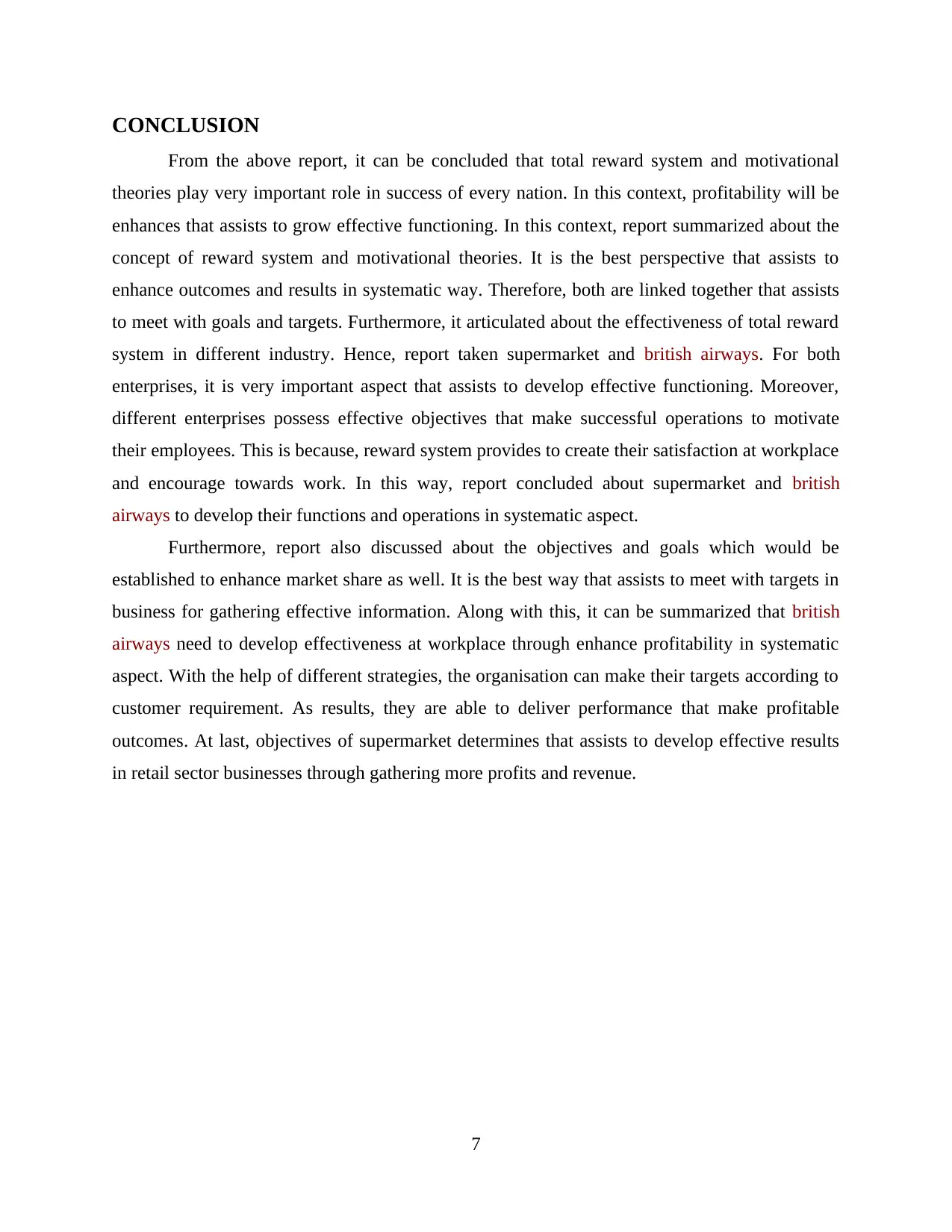
CONCLUSION
From the above report, it can be concluded that total reward system and motivational
theories play very important role in success of every nation. In this context, profitability will be
enhances that assists to grow effective functioning. In this context, report summarized about the
concept of reward system and motivational theories. It is the best perspective that assists to
enhance outcomes and results in systematic way. Therefore, both are linked together that assists
to meet with goals and targets. Furthermore, it articulated about the effectiveness of total reward
system in different industry. Hence, report taken supermarket and british airways. For both
enterprises, it is very important aspect that assists to develop effective functioning. Moreover,
different enterprises possess effective objectives that make successful operations to motivate
their employees. This is because, reward system provides to create their satisfaction at workplace
and encourage towards work. In this way, report concluded about supermarket and british
airways to develop their functions and operations in systematic aspect.
Furthermore, report also discussed about the objectives and goals which would be
established to enhance market share as well. It is the best way that assists to meet with targets in
business for gathering effective information. Along with this, it can be summarized that british
airways need to develop effectiveness at workplace through enhance profitability in systematic
aspect. With the help of different strategies, the organisation can make their targets according to
customer requirement. As results, they are able to deliver performance that make profitable
outcomes. At last, objectives of supermarket determines that assists to develop effective results
in retail sector businesses through gathering more profits and revenue.
7
From the above report, it can be concluded that total reward system and motivational
theories play very important role in success of every nation. In this context, profitability will be
enhances that assists to grow effective functioning. In this context, report summarized about the
concept of reward system and motivational theories. It is the best perspective that assists to
enhance outcomes and results in systematic way. Therefore, both are linked together that assists
to meet with goals and targets. Furthermore, it articulated about the effectiveness of total reward
system in different industry. Hence, report taken supermarket and british airways. For both
enterprises, it is very important aspect that assists to develop effective functioning. Moreover,
different enterprises possess effective objectives that make successful operations to motivate
their employees. This is because, reward system provides to create their satisfaction at workplace
and encourage towards work. In this way, report concluded about supermarket and british
airways to develop their functions and operations in systematic aspect.
Furthermore, report also discussed about the objectives and goals which would be
established to enhance market share as well. It is the best way that assists to meet with targets in
business for gathering effective information. Along with this, it can be summarized that british
airways need to develop effectiveness at workplace through enhance profitability in systematic
aspect. With the help of different strategies, the organisation can make their targets according to
customer requirement. As results, they are able to deliver performance that make profitable
outcomes. At last, objectives of supermarket determines that assists to develop effective results
in retail sector businesses through gathering more profits and revenue.
7
⊘ This is a preview!⊘
Do you want full access?
Subscribe today to unlock all pages.

Trusted by 1+ million students worldwide
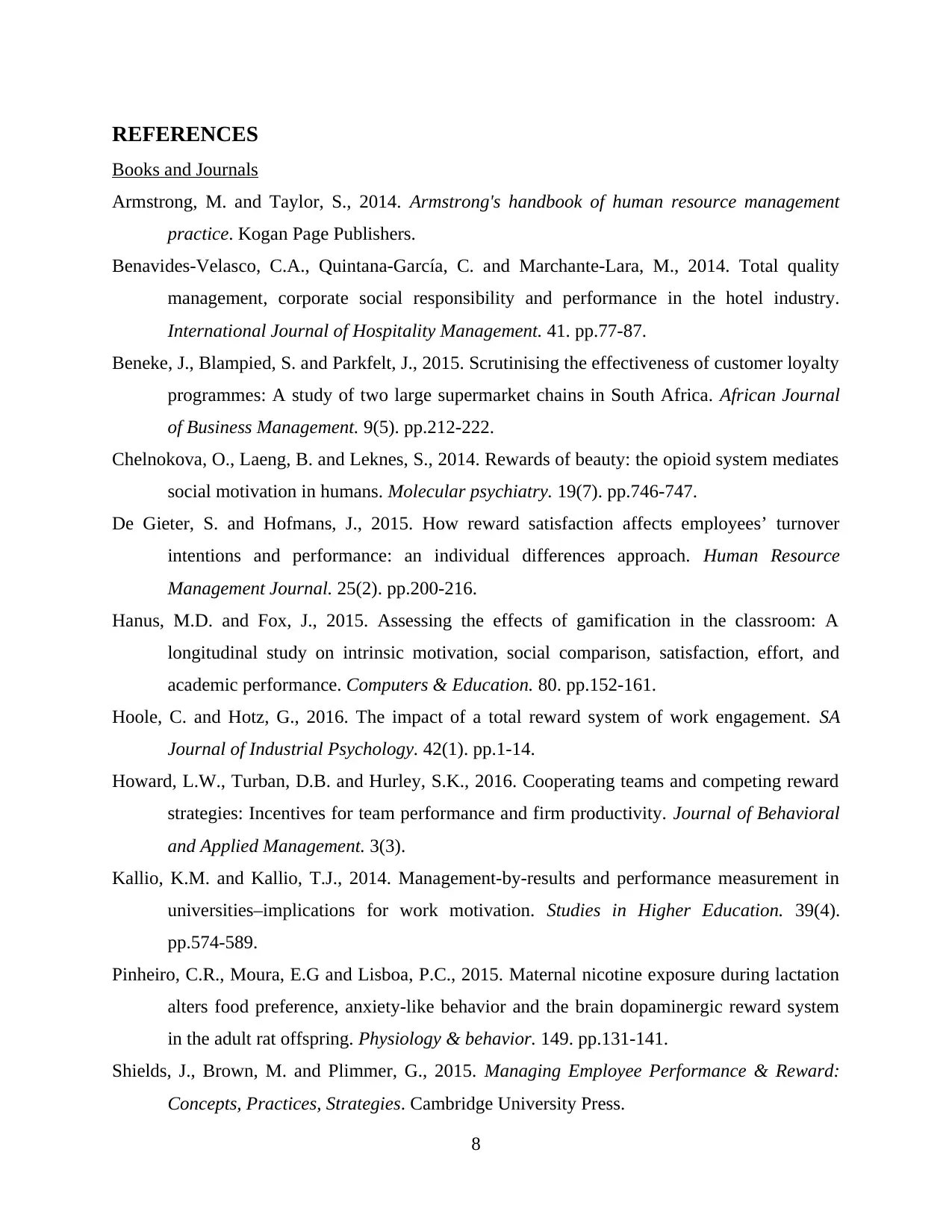
REFERENCES
Books and Journals
Armstrong, M. and Taylor, S., 2014. Armstrong's handbook of human resource management
practice. Kogan Page Publishers.
Benavides-Velasco, C.A., Quintana-García, C. and Marchante-Lara, M., 2014. Total quality
management, corporate social responsibility and performance in the hotel industry.
International Journal of Hospitality Management. 41. pp.77-87.
Beneke, J., Blampied, S. and Parkfelt, J., 2015. Scrutinising the effectiveness of customer loyalty
programmes: A study of two large supermarket chains in South Africa. African Journal
of Business Management. 9(5). pp.212-222.
Chelnokova, O., Laeng, B. and Leknes, S., 2014. Rewards of beauty: the opioid system mediates
social motivation in humans. Molecular psychiatry. 19(7). pp.746-747.
De Gieter, S. and Hofmans, J., 2015. How reward satisfaction affects employees’ turnover
intentions and performance: an individual differences approach. Human Resource
Management Journal. 25(2). pp.200-216.
Hanus, M.D. and Fox, J., 2015. Assessing the effects of gamification in the classroom: A
longitudinal study on intrinsic motivation, social comparison, satisfaction, effort, and
academic performance. Computers & Education. 80. pp.152-161.
Hoole, C. and Hotz, G., 2016. The impact of a total reward system of work engagement. SA
Journal of Industrial Psychology. 42(1). pp.1-14.
Howard, L.W., Turban, D.B. and Hurley, S.K., 2016. Cooperating teams and competing reward
strategies: Incentives for team performance and firm productivity. Journal of Behavioral
and Applied Management. 3(3).
Kallio, K.M. and Kallio, T.J., 2014. Management-by-results and performance measurement in
universities–implications for work motivation. Studies in Higher Education. 39(4).
pp.574-589.
Pinheiro, C.R., Moura, E.G and Lisboa, P.C., 2015. Maternal nicotine exposure during lactation
alters food preference, anxiety-like behavior and the brain dopaminergic reward system
in the adult rat offspring. Physiology & behavior. 149. pp.131-141.
Shields, J., Brown, M. and Plimmer, G., 2015. Managing Employee Performance & Reward:
Concepts, Practices, Strategies. Cambridge University Press.
8
Books and Journals
Armstrong, M. and Taylor, S., 2014. Armstrong's handbook of human resource management
practice. Kogan Page Publishers.
Benavides-Velasco, C.A., Quintana-García, C. and Marchante-Lara, M., 2014. Total quality
management, corporate social responsibility and performance in the hotel industry.
International Journal of Hospitality Management. 41. pp.77-87.
Beneke, J., Blampied, S. and Parkfelt, J., 2015. Scrutinising the effectiveness of customer loyalty
programmes: A study of two large supermarket chains in South Africa. African Journal
of Business Management. 9(5). pp.212-222.
Chelnokova, O., Laeng, B. and Leknes, S., 2014. Rewards of beauty: the opioid system mediates
social motivation in humans. Molecular psychiatry. 19(7). pp.746-747.
De Gieter, S. and Hofmans, J., 2015. How reward satisfaction affects employees’ turnover
intentions and performance: an individual differences approach. Human Resource
Management Journal. 25(2). pp.200-216.
Hanus, M.D. and Fox, J., 2015. Assessing the effects of gamification in the classroom: A
longitudinal study on intrinsic motivation, social comparison, satisfaction, effort, and
academic performance. Computers & Education. 80. pp.152-161.
Hoole, C. and Hotz, G., 2016. The impact of a total reward system of work engagement. SA
Journal of Industrial Psychology. 42(1). pp.1-14.
Howard, L.W., Turban, D.B. and Hurley, S.K., 2016. Cooperating teams and competing reward
strategies: Incentives for team performance and firm productivity. Journal of Behavioral
and Applied Management. 3(3).
Kallio, K.M. and Kallio, T.J., 2014. Management-by-results and performance measurement in
universities–implications for work motivation. Studies in Higher Education. 39(4).
pp.574-589.
Pinheiro, C.R., Moura, E.G and Lisboa, P.C., 2015. Maternal nicotine exposure during lactation
alters food preference, anxiety-like behavior and the brain dopaminergic reward system
in the adult rat offspring. Physiology & behavior. 149. pp.131-141.
Shields, J., Brown, M. and Plimmer, G., 2015. Managing Employee Performance & Reward:
Concepts, Practices, Strategies. Cambridge University Press.
8
Paraphrase This Document
Need a fresh take? Get an instant paraphrase of this document with our AI Paraphraser
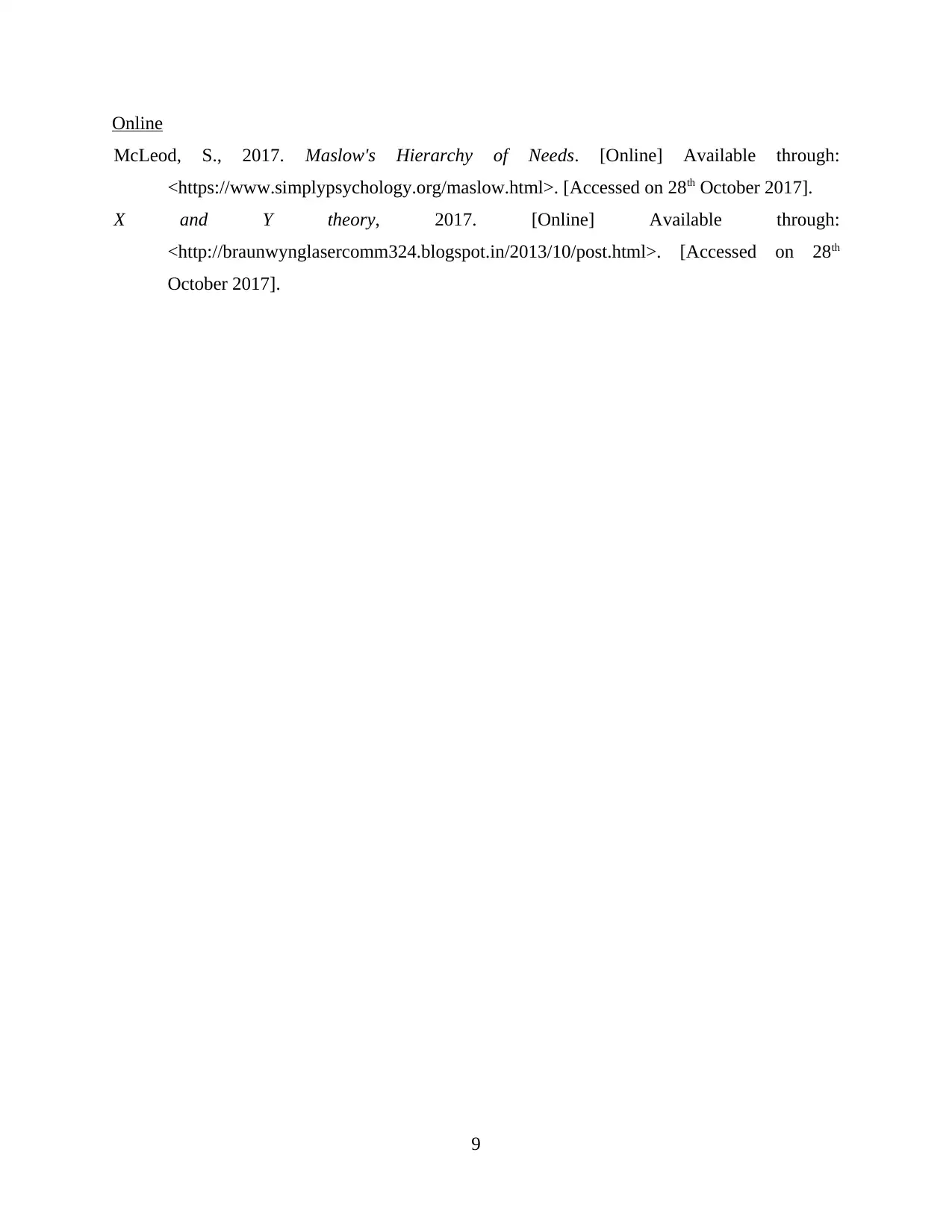
Online
McLeod, S., 2017. Maslow's Hierarchy of Needs. [Online] Available through:
<https://www.simplypsychology.org/maslow.html>. [Accessed on 28th October 2017].
X and Y theory, 2017. [Online] Available through:
<http://braunwynglasercomm324.blogspot.in/2013/10/post.html>. [Accessed on 28th
October 2017].
9
McLeod, S., 2017. Maslow's Hierarchy of Needs. [Online] Available through:
<https://www.simplypsychology.org/maslow.html>. [Accessed on 28th October 2017].
X and Y theory, 2017. [Online] Available through:
<http://braunwynglasercomm324.blogspot.in/2013/10/post.html>. [Accessed on 28th
October 2017].
9
1 out of 11
Related Documents
Your All-in-One AI-Powered Toolkit for Academic Success.
+13062052269
info@desklib.com
Available 24*7 on WhatsApp / Email
![[object Object]](/_next/static/media/star-bottom.7253800d.svg)
Unlock your academic potential
Copyright © 2020–2026 A2Z Services. All Rights Reserved. Developed and managed by ZUCOL.





